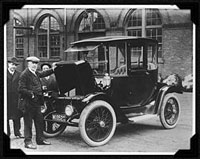Dearest Umbra,
Why are electric cars considered so great? They don’t pollute the air where they are driven. But certainly when they are plugged in they use energy from a power plant, which does pollute and also contributes to global warming. Doesn’t this just move the pollution from one area to another? Then you have to consider that there are power losses when electric energy travels over transmission lines. Are electric cars more efficient — using less energy per mile? What gives here?
Patricia Rice
Lafayette, Colo.
Dearest Patricia,
Many people think electric cars are the bee’s knees. They do have tangible benefits and a lot of potential, but also a few drawbacks.

Before cheap oil, electric cars were
common.
Photo: Courtesy National Museum of
American History
The benefits include a totally silent engine, and — depending on gas and electricity prices — a cheaper ride than a comparable car powered by gas or diesel. Also, as you suspected, electric cars are much more efficient than gas-powered ones. This has to do with engine design. For an example, let’s look at the new “it” car for greens with means: the 250-mile-range, 0-to-60-in-four-seconds Tesla Roadster. An Australian newspaper raves, “Unlike a traditional V8 engine, with its eight pistons, eight connecting rods, crankshaft, valves, oil pumps, and other mechanicals, the Tesla’s engine has only one moving part. This gives it an efficiency rating of about 95 percent, compared with the 20 percent (or less) of an internal combustion engine.” I doubt you or I will be snapping up a Tesla anytime soon, but it’s still nice to think about a pleasant, simple engine like that.
But even though the engines are more efficient, that doesn’t mean electric cars are more efficient overall. When you consider the fuel source, the calculations get tricky, because the source of electricity for an electric car can vary quite a bit. In a paper Tesla Motors published [PDF] recently, the company calculates that when the source of electricity is an efficient combined-cycle natural-gas generator, the fuel efficiency of the Roadster, even taking into account the power lost during transmission, is nearly twice that of the Prius. When the actual average energy mix of the U.S. grid was considered, the Roadster still beat all the other gasoline and diesel vehicles (even hybrids), though not by nearly as much. As far as pollution goes, check out this handy lifecycle assessment (hooray) to get a better sense of how different types of power sources affect the CO2 produced by different types of cars.
Your concern about pollution and global warming is justified. I think the real hope is that someday our power sources won’t be so dirty, which will make electric cars a near-perfect way to get around. While much of the power in the U.S. and the rest of the world currently comes from coal, nuclear, and natural gas, it’s at least possible to run your electric car on clean, renewable energy. Check your region’s source if you don’t know where your power comes from, and look into the option of buying green energy from your utility. It costs a little more right now, but it’s worth it.
Right now, the electric car might not be The Answer, despite what rabid fans say. Besides the likelihood of fueling with dirty power, some of the current models have a relatively limited range — depends on the length of the cord. But as the Tesla people show, there are brains out there working on improving this scheme. Someday we will all be zooming silently around. (You know I was kidding about the cord length, right?)
Juicily,
Umbra

